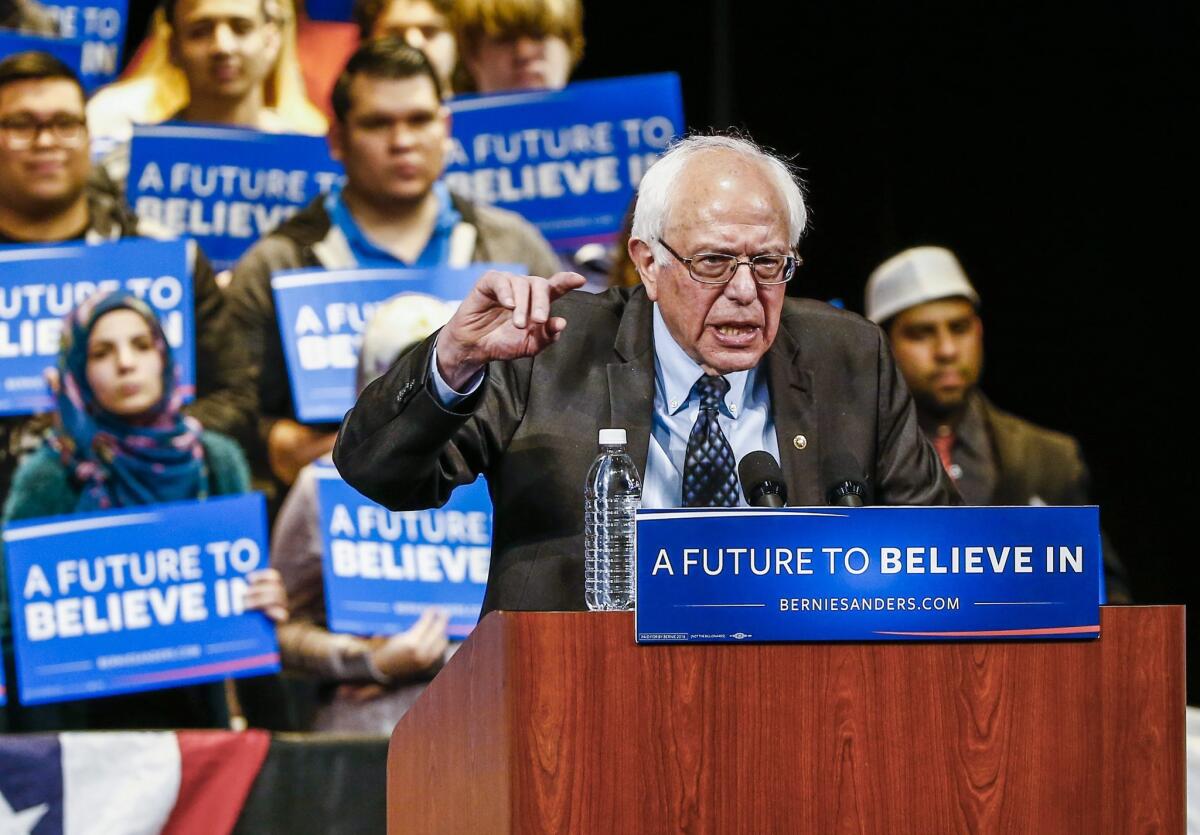Readers React: Free trade benefits the U.S.? A few hundred thousand unemployed Americans might object.

Sen. Bernie Sanders, who has made opposition to free-trade deals a centerpiece of his campaign, speaks in Dearborn, Mich., on March 7.
- Share via
To the editor: The Times takes issue with the anti-free-trade rhetoric coming from the presidential campaigns of Republican candidate Donald Trump and Democratic candidate Bernie Sanders. (“Sanders and Trump dump on free trade, but they’re not telling the whole story,” editorial, March 10)
Regarding the cause of the disappearance of American jobs to other countries, I would submit that one needs to look beyond the free-trade agreements to the C-suites, boardrooms and stockholders of American corporations.
The pressure on corporations to continuously expand profits on a quarterly basis to please shareholders leads every time to a focus on cost cutting, particularly where revenue growth is more modest. The biggest expense on most company’s books is employee pay, so reducing that cost is often the first solution to be considered.
I worked for a public company in financial services that began outsourcing jobs to India and Russia nearly 20 years ago. The argument was that for one U.S. data entry or programming resource, between five and eight individuals could he hired in low-cost overseas centers. We outsourced, our competitors did the same, our earnings improved and our shareholders (which of course included the highly paid executives in the C-suites) benefited.
And the losers? Newly unemployed American workers.
Laurie S. Adami, Santa Monica
..
To the editor: I’m so glad I subscribe to The Times. Reading the editorial on Thursday, I learned that the goal of trade agreements was to “bring the rest of the world up to the labor, environmental and commercial standards that apply here .”
Silly me. I thought trade deals were about businesses, jobs and creating economies that were mutually beneficial to the trading partners.
How has the North American Free Trade Agreement worked out for the United States? More than 20 years ago, Ross Perot predicted that NAFTA would create a “giant sucking sound” of jobs fleeing this country, and he was right. About a year ago, The Times published an op-ed article on the proposed Trans Pacific Partnership coauthored by Robert Reich, President Clinton’s labor secretary, that noted “NAFTA has cost the U.S. economy hundreds of thousands of jobs.”
One definition of insanity is redoubling your efforts when your existing ones aren’t working. The Times’ logic on free trade is that, despite NAFTA’s failure to create more jobs, we need similar agreements with other nations. Sounds crazy to me.
Carl McHenry, Yucaipa
..
To the editor: So-called free trade has had a profoundly deleterious and disproportionate impact on the American middle class.
U.S. workers have not been competing on a level playing field with their counterparts in developing nations. President Clinton claimed that NAFTA would achieve that goal with Mexico, bringing up the standards of that nation’s workers to ours. He was wrong.
The United States no longer is the world’s top manufacturing nation, and it appears that we will not return to that status ever again. Waiting for developing countries to improve working conditions and compensation is a fool’s errand.
If the United States wishes to compete globally, it must do so with its first-world equals and under the same rules. Otherwise, we need to re-implement tariffs and return to protecting the American workforce.
Bob Teigan, Santa Susana
Follow the Opinion section on Twitter @latimesopinion and Facebook
A cure for the common opinion
Get thought-provoking perspectives with our weekly newsletter.
You may occasionally receive promotional content from the Los Angeles Times.






